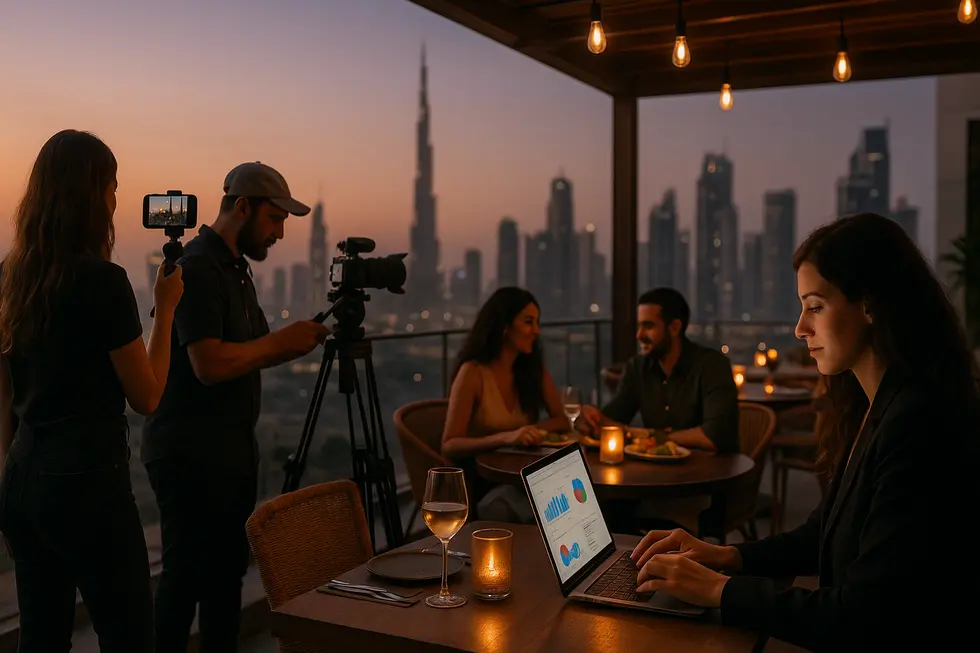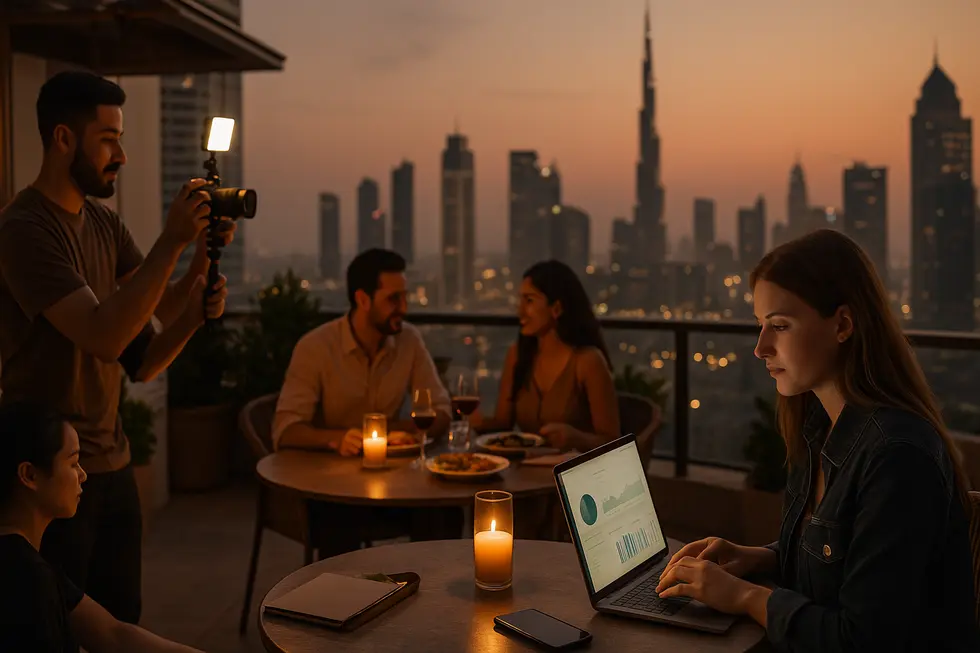Instagram Isn’t Enough: Smarter Social Media for Restaurants in 2025
Activate smarter social media for restaurants with video-first content, social commerce and omnichannel tactics to boost bookings and revenue.
Social Media for Restaurants
Instagram Isn’t Enough: Smarter Social Media for Restaurants in 2025 — Diversify Platforms and Master Short-Form Video

1. From Scroll to Sale: AI, Short-Form Video and Algorithm Tactics for Restaurant Social Media
Technological Imperatives for smarter social media marketing require combining platform diversification, short-form video, AI, and algorithm insight into one operational workflow. Restaurants must treat short videos as their primary storytelling unit, using quick menu highlights, behind-the-scenes clips, and staff moments to spark discovery across short-form platforms. AI tools speed production, suggest hooks, and optimize captions and timing based on performance signals. Algorithms reward authentic engagement, so content should prompt comments, saves, and shares rather than polished broadcasts. Social commerce features link discovery to orders, reducing friction between inspiration and purchase. Crucially, an omnichannel brand presence keeps messaging, offers, and loyalty seamless across channels and email. Measure outcomes with unified analytics that tie views to visits and revenue, and use those signals to refine paid spend. For tactical guidance on building a distinct brand online, see restaurant branding Dubai.
More trends and data: https://tableneeds.com/blog/marketing/2025-restaurant-marketing-trends/
2. Paid Social Economics: ROI of Short-Form Video and Platform Diversification
Short-form video and platform diversification change the economics of restaurant marketing. Paid social enables precise local reach, promoting offers within tight radii and specific demographics. Because short videos deliver up to double engagement versus static posts, ad spend focused on short-form platforms often yields higher impressions per dollar. Smart budgets pair modest paid boosts with user-generated content and micro-influencer collaborations to reduce production cost and raise authenticity. Mid-size restaurants commonly split budgets across creative production, targeted ads, and website optimization for measurable returns. AI-driven personalization improves ad relevance and lift. Accurate local profiles and mobile websites reduce friction from discovery to order. Email and on-site metrics complete the attribution picture, revealing lifetime value and repeat revenue. For local brand positioning guidance, see restaurant-brand-stand-out-dubai-43167. Budget allocations vary by restaurant size and goals, but local-targeted campaigns often convert visits into immediate revenue. External trend analysis: https://www.superiorseating.com/blog/2025-social-media-trends-for-restaurants
3. Local Trust and Global Shifts: Societal and Geopolitical Forces Shaping Multi-Platform Short-Form Strategy
Consumers now expect local relevance and genuine connection from restaurants. Short-form videos should reflect neighborhood stories, staff voices, and cultural touchpoints to build trust quickly. When demographics shift by region, platform choice and tone must adapt; older patrons respond to community-focused posts on mainstream networks, while younger diners favor playful, vertical clips. Regulatory changes on privacy and advertising require transparent data practices and opt-in messaging, so collect only necessary first-party information and clearly explain ordering flows. Geopolitical shifts can change platform availability and user habits, so maintain flexible content pipelines and repurpose assets across channels to reach displaced or migrating audiences. Partnering with local suppliers, sponsoring events, and amplifying user-generated content creates resilience and keeps messaging authentic. These societal and geopolitical considerations turn platform diversification and short-form video into tools for trust, not just reach. For practical branding guidance see restaurant branding in Dubai. Source: https://tableneeds.com/blog/marketing/2025-restaurant-marketing-trends/
Smarter Social Media for Restaurants in 2025 — Social Commerce, Omnichannel Integration, and Paid Advertising

1. From Feeds to Funnels: AI, Platforms and Social Commerce Infrastructure
Smart social marketing depends on a technology stack that turns attention into orders and loyalty. Platforms like short-form video networks act as discovery engines, while embedded commerce layers let guests order or reserve without leaving the app. AI personalizes creative and delivery, optimizing captions, thumbnails, and ad targeting based on behaviors. Behind the scenes, APIs, payment connectors, and loyalty integrations ensure parity across channels and help build guest loyalty. Search indexing of social posts extends your listing reach, so social content must be optimized for local queries. Paid local ads feed on this infrastructure, using geo-targeting and AI-driven lookalikes to convert impressions into foot traffic. Equally important is a data flow that links social interactions to email and POS, enabling automated remarketing and attribution. Investing in these foundations makes omnichannel promises actionable and measurable, turning social platforms into reliable revenue paths. Further reading: https://www.superiorseating.com/blog/2025-social-media-trends-for-restaurants
2. Profit-Driven Social Strategy: Local Paid Ads, Cross-Border Dynamics, and Measurable ROI
Shifting social media from a cost center to a revenue engine requires ROI metrics and platform-aware spend. Blend social commerce, loyalty emails, and in-app ordering into a unified funnel that reduces friction between discovery and purchase. Use short-form video to drive immediacy, retarget viewers with local paid ads within a radius for weekend offers. Test creative and audience segments, then reallocate budget to high-performing slots. For multi-location or cross-border brands, segment offers by market and comply with platform restrictions and local regulations. Coordinate pricing, promotions, and inventory across social listings and your website so searchers convert when intent is high. Incentivize user-generated referrals and VIP rewards to lower acquisition costs. For restaurants in tourist or global cities, localize content and ads to currency, language, and payment norms; learn from examples of restaurant branding in Dubai to adapt messaging. Trend analysis here: https://tableneeds.com/blog/marketing/2025-restaurant-marketing-trends/
3. Trust and Transparency: How UGC, Privacy, and Regulation Shape Restaurant Social Commerce
Restaurants moving beyond Instagram must treat social channels as trusted commerce environments, not just broadcasting tools. Authentic user-generated content acts as social proof and reduces skepticism, so encourage guests to share photos, reviews, and short videos while clearly crediting creators. Transparency about data use—how ordering, loyalty, and ad targeting collect and store information—builds trust and reduces opt-outs. Align privacy notices, consent prompts, and messaging across social, email, and onsite ordering to avoid confusion and legal risk. Moderation policies should balance community authenticity with safety and accessibility. Work with local regulators and platform rules to handle promotions, disclosures, and paid partnerships correctly. Integrating these practices strengthens loyalty, increases conversion, and protects brand reputation. For practical tactics on turning community into repeat customers, see guidance on building guest loyalty. More context on trends and platform features is available at https://tableneeds.com/blog/marketing/2025-restaurant-marketing-trends/
Instagram Isn’t Enough: Smarter Social Media for Restaurants in 2025 — Community Engagement, UGC, and Email Marketing

1. From Reels to Orders: Integrating Short-Form Video, Social Commerce, and Community
UGC, short-form video and social commerce should act as one system, turning discovery into repeat visits. Short clips showcase menu items, specials and staff personality, while in-app ordering and shoppable posts remove purchase friction. Encourage guests to tag you and reward them; reposting authentic photos and reviews amplifies trust and local word-of-mouth. Use interactive tools — polls, Q&As and prompt replies — to convert viewers into regulars and gather fast feedback. Capture first-party data from social orders and loyalty sign-ups, then use email automation to send tailored offers that increase frequency. Choose platforms by audience: Facebook for discovery, Instagram and TikTok for visual buzz, YouTube for longer stories. Synchronize creative and promotions so customers see a coherent brand. Integrating content, commerce and community turns engagement into revenue and lasting loyalty. Read more on build guest loyalty. More details: 2025 restaurant marketing trends.
2. Monetization, Compliance, and Data Sovereignty: Economic and Geopolitical Stakes for Restaurant Social Media
Restaurants' social media strategies now sit at the intersection of monetization and regulation. Short-form video, in-app ordering, and paid ads shorten the path to purchase and raise revenues, while user-generated content lowers production costs and boosts trust. Heavy ad budgets demand clear ROI, and email marketing provides efficient retention and measurable value. At the same time, data privacy laws such as GDPR and CCPA impose strict consent and storage requirements. Cross-border data flows and platform governance turn simple campaigns into geopolitical puzzles for multi-location brands. Local engagement and partnerships strengthen social capital and buffer supply or policy shocks. Practical steps include explicit consent flows, minimal data retention, and secure CRM linkages to email lists. Pair these digital tactics with focused brand work like restaurant branding Dubai to maintain customer trust and comply with local rules. See detailed trends: https://tableneeds.com/blog/marketing/2025-restaurant-marketing-trends/
3. Turning Diners into Advocates: Local Engagement, UGC Trust, and Demographic Targeting
Restaurants converting casual browsers into regulars treat social channels as listening posts and living menus. Prioritize local conversations: respond to comments, run neighborhood polls, and spotlight nearby partnerships to anchor your brand in community life (restaurant-brand-stand-out-dubai). Encourage customers create content with clear prompts, hashtags, and simple incentives; re-share reviews and dining photos with permission, turning guests into credible advocates. Use demographic targeting to push offers to nearby diners and tailor messaging for families, students, or professionals. Blend short-form video teasers with customer clips to amplify authenticity, then capture permissioned content into an email welcome series that personalizes offers and nudges repeat visits. Email supports longer storytelling, event invites, and loyalty touches that social alone can’t sustain. Measure success by local engagement rates, UGC volume, and email-driven return visits, refining creative and timing based on local traction. See 2025 trend signals: https://tableneeds.com/blog/marketing/2025-restaurant-marketing-trends/
Final thoughts
Instagram still plays a central role in visual storytelling, but by 2025 it must be part of a broader, revenue-driven ecosystem. For Dubai 4-star restaurants and hotel outlets, that means prioritising short-form video across TikTok, Reels and Shorts; enabling social commerce and tight omnichannel tracking; investing paid budget to amplify proven creative; and building community through UGC and segmented email flows. Start by mapping guest journeys from discovery to booking, implement the right integrations, and test a small set of video-led campaigns. The goal is simple: move from social impressions to measurable covers and recurring guests. Let’s take your F&B social strategy to the next level – contact us now.
About us
Markus Mensch is a strategic marketing consultancy specialising in hospitality and F&B brands, with offices in Dubai and Germany. Since 2007, the company has supported over 1,000 businesses in increasing visibility, guest loyalty, and revenue – without relying on paid ads. With the proprietary OBC-Strategie®, Markus Mensch and his team provide structured, result-oriented solutions tailored to 4-star hotels and restaurants. The company combines marketing expertise, industry experience, and hands-on implementation to help clients achieve sustainable growth. Made in Germany – Built for Dubai
Transform Your Hospitality Business Today
Are you ready to boost your revenue and enhance guest loyalty? Let's get started!

